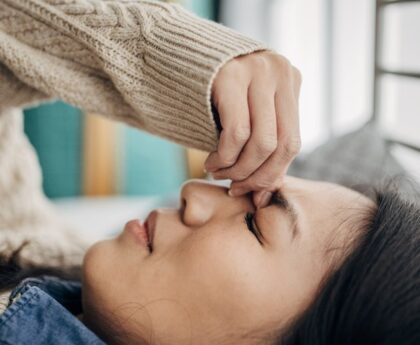Anyone who has experienced a persistent ringing, buzzing or whooshing sound in their ears knows how annoying it can be — but is it a sign of something serious?
Approximately 50 million people in the United States are affected by tinnitus, a condition that fills the ears with internal sounds no one else can hear, according to Cleveland Clinic.
Daniel S. Troast, doctor of audiology at HearUSA, a hearing aid provider in Winter Garden, Florida, shared with Fox News Digital the symptoms, causes and myths surrounding tinnitus, as well as ways to treat and prevent it.
EAR INFECTIONS IN YOUNG CHILDREN COULD LEAD TO DELAYED SPEECH FOR THEM, STUDY FINDS
“Most of us have experienced ringing in our ears after going to a concert, but if it lasts for less than a day, it’s very often not a cause for concern,” said Troast.
Tinnitus is defined as a “persistent ringing, buzzing or whooshing sound in the ears that the patient can hear, but no one else can,” he said.
Some patients have even reported hearing crickets or music in their heads, according to the doctor.
The most common cause of tinnitus is noise-induced hearing loss. Approximately 90% of people suffering from tinnitus have some form of hearing loss, according to Mayo Clinic.
“Tinnitus is more a brain condition than it is a hearing condition,” said Troast. “Essentially, it’s the brain’s response to a change in the auditory system.”
ALL EARS FOR ‘SEXY’ HEARING AIDS: DESIGNERS TRANSFORM KEY DEVICES INTO COOL ACCESSORIES
For someone with normal hearing, the brain is used to receiving sound signals at various frequencies moving through the ear canal.
“However, when someone has hearing loss, the brain stops receiving those signals — and the tinnitus is the brain’s response to this miscommunication with the ears,” according to the audiologist.
“Hearing loss and resulting tinnitus could come from a single exposure — like military personnel firing weapons — or more commonly, built up over years of exposure to noise at dangerously high levels, like a musician or frequent concertgoer,” Troast said.
Other possible causes of tinnitus and hearing loss include certain medications, blockages from earwax, ear infections, dental issues and head or neck injuries.
The most prominent myth is that tinnitus can be cured, said Troast.
“While it can be managed effectively, nothing will cure tinnitus entirely. Because of this, bogus tinnitus ‘cures’ regularly circulate on social media,” the doctor warned.
Some of the most common recommendations include ear drops and supplements, which have no effect aside from a potential placebo, according to Troast.
“As mentioned earlier, tinnitus is a brain condition, not an ear condition,” he said.
“So, anything that goes into your ear would do nothing to fix the underlying problem, which is a miscommunication between your ears and your brain.”
Another faux “cure” involves tapping the back of the head to create a reverberating sound.
PREVENT HEARING LOSS WITH THESE 6 EXPERT TIPS
“While this may stop the tinnitus for a few seconds and may be an effective coping method, it will never make the tinnitus go away,” said Troast.
“When a person taps their head in this manner, they’re replacing the sound of their tinnitus with the sound of the thumping — but when the thumping stops, the tinnitus returns.”
While tinnitus isn’t physically dangerous, Troast warned that it can be extremely damaging for patients’ mental health, with proven negative effects on psychological well-being.
“If you’re suffering from tinnitus, a great first step is always to see an audiologist who can conduct a hearing test,” he advised. “The audiologist will be able to determine if hearing loss is the root cause of your tinnitus and can then establish a treatment plan.”
That plan will most often include hearing aids, which will amplify external sounds to help reduce the person’s focus on the tinnitus.
CLICK HERE TO SIGN UP FOR OUR HEALTH NEWSLETTER
Cognitive behavioral therapy (CBT) with a psychologist can also be very effective when administered in tandem with audiological treatment, Troast said.
“CBT teaches the patient to live with tinnitus, helping them understand that they can acknowledge the existence of the sound without the doom and gloom that it’s typically associated with,” he said.
The best way to prevent tinnitus is to limit your exposure to loud noise, the audiologist said.
He recommends wearing hearing protection in loud environments such as concerts and sporting events and while using loud equipment like a lawnmower or leaf blower.
“It’s also important to limit your time listening to headphones and earbuds at loud volumes,” he added.
Another step toward prevention is getting a regular hearing test.
“Hearing tests not only help in determining if you suffer from hearing loss, as mentioned above, but they also have the potential to point you in a direction that will treat both hearing loss and tinnitus,” said Troast.
Avoiding total silence is another way to reduce symptoms.
“Patients often say it’s most noticeable when they’re trying to sleep,” said Troast. “Having some sort of white noise or brown noise playing in the background can help drown out the incessant ringing.”
For more Health articles, visit www.foxnews.com/health.
Article Source: Health From Fox News Read More




